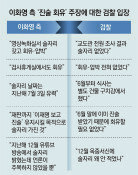Artificial control of initial apartment sale prices could cause side effects
Artificial control of initial apartment sale prices could cause side effects
Posted July. 10, 2019 07:38,
Updated July. 10, 2019 07:38
The government has announced a plan to expand the state-imposed ceiling on the initial sale price of new apartments built on privately-owned housing land. Land, Infrastructure and Transport Minister Kim Hyun-mi told the National Assembly on Monday that the government is considering ways to revise the enforcement decree of the Housing Act to change the conditions for designating apartment houses subject to the price ceiling. The remark means that the government will curb the rising initial sale prices of new apartments in Seoul to put a brake on them prompting other property prices to go up. As of May, the initial apartment sale prices were about 12.5 percent higher than a year earlier.
The expanded initial sale price ceiling would subject apartment homes built on private land to review by local government’s price review committees whether their initial sale prices are “appropriate.” The system can significantly lower initial sale prices of apartment homes built on privately owned land, as they are determined by the government-set basic construction costs added by additional costs – the same way that the initial prices of apartment houses built on publicly owned land are set.
Such a plan could produce some desired results in a short term, as it would attract home buyers to newly built apartments and thus help lower the prices of existing ones. However, it cannot be the fundamental measure for price stabilization. As was the case with the initial sale of new apartment homes built in Pangyo on the outskirts of Seoul in 2006 that were called “jackpots,” low initial prices are prone to rise in accordance with other apartments in surrounding areas. The initial price cap could stimulate speculative demand seeking such opportunities.
Another issue is that a worsened profitability of apartment reconstruction projects could result in mid- to long-term supply shortages, destabilizing the property market. In 2007, the Roh Moo-hyun administration expanded the price cap to apartments built on privately owned land, only to see a supply drop by more than 130,000 units in just three years.
Moreover, the government is attempting to advance the timing of the application of the price ceiling, targeting apartment complexes to be rebuilt in southern Seoul that have already received approvals. Such a move would undermine the market’s trust in government policies and cause a controversy over the constitutionality of retroactive legislation that could violate property rights.
Policies designed to artificially lower initial sale prices go against the market principle and thus have clear limits and side effects. It is more important than artificial price control is to recognize the demands in the property market and seek ways to disperse and absorb them. In addition, the government should thoroughly crack down on speculative property investments to prevent actual home buyers from being affected.







